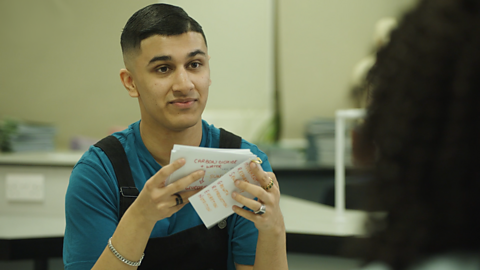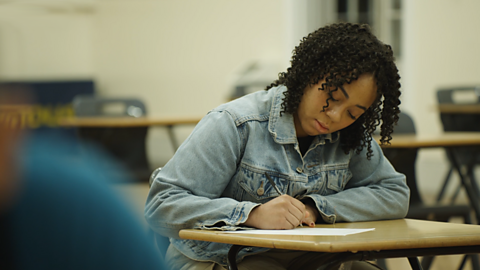This article was last updated on 5 May 2023.
We know you'd rather be watching the grass grow on the school field than getting started with your Nationals or GCSE revision, but once you make that leap and get started, it does get easier to make progress. Trust us.
In this short video, our Mind Set coaches have some advice about what really helped them get started with their revision. Once you've spent a couple of minutes on the video, scroll down for a recap of their useful advice.
Video: How to get started
Nung Start as early as you can and then gradually build it up.
Milly During my mocks, I started off very slow with my revision, beacuse I wasn't sure if I was doing it right or not. But once I got into that rhythm, I identified what revision techniques were really cause for me to help me remember them key facts.
Daniel I started my hardest subjects first as I could dedicate more time to them. I find English literature to be one of the hardest subjects for me, so reading a little bit of English literature every night helps with my performance and grades.
Lauren So when I was starting with revision, what I did was, I knew that I didn't like a particular subject, so I made sure that I did that one first. Then after that, I treateds myself to my favourite topic from my favourite subject, and then I got two out the way. So then I got the worse one out the way, I got the best one out of the way, and then I knew that I'd be fine after that and everything would just be all right.
Dr Radha Set up your study space. What kind of environment works best for you? What level of noise do you prefer? Where is the optimal place? What's on your walls? What are you sitting on or leaning on? What do you like to have with you? Water, snacks, books, notes?
Shay I think making your revision active is really important. Just whatever works for you. Mind maps, flashcards, anything, but if you're just sitting reading your notes all the time, unless you've got a photographic memory, it's not all going to go in.
Josh Watching videos online can really help to bring your notes to life. Make sure you watch actively, trying to take in information that might be useful for the exam and not passively watching video after video.
Dr Radha Build in rewards for your revision. It might be your favourite snack, using social media or having a bit of fresh air.
Josh Set short term SMART goals, not anything too ambitious or too far in the future.
Nung I set myself a main goal every day, while I was revising was to get up at the same time I would for school and I knew when I achieved my first day of getting up at the same time as school, revision was so much easier.
Dr Radha Set yourself a time limit for revising each target area. Mixing things up means you are less likely to get stuck in a revision rut early on.
Lauren If you're worried about starting revision or just anything throughout the revision process, go and speak to a teacher, doesn't even have to be the teacher for the subject you're worried about, just go and speak to any teacher you get on well with.
Dr Radha Good habits form faster when we do them more often, so try to incorporate regular studying into your routine. If you aim to sit down at your desk for a short period every day, then the workload is easier to manage than if you save it all up for one day of the week.
Josh You don't have to wait until others have started to achieve some small wins. It's never too early to open your books and get stuck in.
Jacintha If you start now, it becomes part of your routine so that when exams come round, it won't feel nearly as intense.
Our coaches’ top tips on how to get started

It's important not to think too far ahead when you start your revision – it can be a long road! Our expert, Anxiety Josh, advises to set short-term, smart goals, and not to do anything too ambitious or plan too far in the future. During her mock GCSE exams, Millie says she started off really slowly with her revision, she wasn’t sure if she was doing it right or not, but once she got into it, she identified which revision techniques were really good for her. Mindset coach Lauren, decided to study her least favourite subject first, then treated herself by doing her favourite subject next.
Shay's top tip is to make your revision active. Retrieval practice using flash cards is one way to actively revise. You can find out more about how to do that in this video.
Daniel found English Literature to be one of the hardest subjects, so reading a little bit every night helped with his performance and grades. Nung recommends starting as early as you can and then gradually building up the amount of revision you do. Our Mind Set expert, Dr Radha, suggests that you build in rewards for your revision. It might be your favourite snack, using social media, or having a bit of fresh air – just make sure you take time to do something you enjoy!
For more stress-relieving tips on the road to your exams check out this guide

What is The Mind Set?
The Mind Set is two things: a series of films to help support you through your GCSEs and Nationals and a group of amazing young coaches who appear in the films.
Our coaches have been through their GCSEs or National Qualifications already. They come from all different backgrounds and all corners of the UK and they’ve all faced different challenges in getting to grips with exam revision. What they’ve got in common is that they all have heaps of exam revision tips, advice, helpful hints, hacks and wonderful words of wisdom they want to share with you.
In the series, we also hear advice from mental health professionals like Josh Fletcher (AKA “Anxiety Josh”) on how to look after your wellbeing and stay resilient during revision and exams season and we have top revision hacks from our very own memory expert, Dr Vanessa Loaiza!
Explore the Bitesize Study Support pages for more information and revision support.
This article was last updated on 12 October 2023.
If you need support
You should always tell someone about the things you’re worried about. You can tell a friend, parent, guardian, teacher or another trusted adult. If you're struggling with your mental health, going to your GP can be a good place to start to find help. Your GP can let you know what support is available to you, suggest different types of treatment and offer regular check-ups to see how you’re doing.
If you’re in need of in-the-moment support you can contact Childline, where you can speak to a counsellor. Their lines are open 24 hours a day, 7 days a week.
There are more links to helpful organisations on BBC Action Line.
More like this
How to revise: Planning and timetables
Some top tips to help you get organised with your revision.

Revision: Memory hacks and tips
Memory hacks and tips from our coaches to help you with revision.

Exams and assessments
The Mind Set coaches discuss their tips on how to navigate your exams and assessments.
